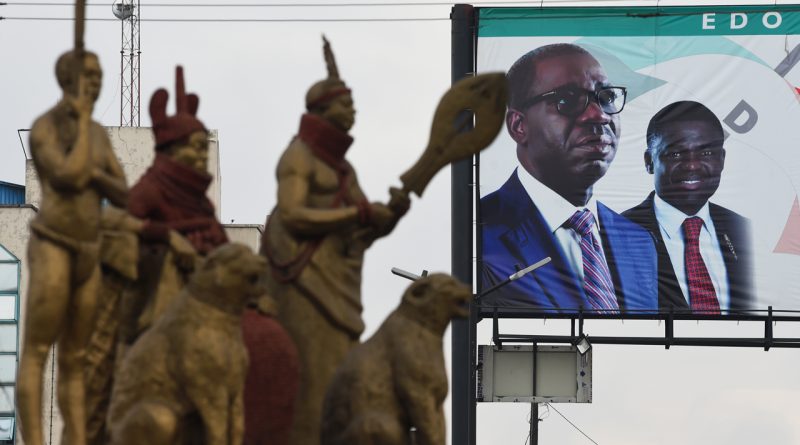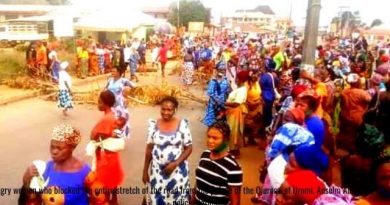Edo State politics: Whither Esan people? | The Guardian Nigeria News – Nigeria and World News — Opinion — The Guardian Nigeria News – Nigeria and World News – Guardian Nigeria

I focus on contemporary political development in Edo State. The rider of the title of this paper indicates a sort of quandary for people in search of direction and also hints at certain despondency. But I take this gathering as a rally for a giant stride in the quest for the development of the Esan people and in the context of a national polity that is completely anomic and gradually unraveling. Therefore, it is appropriate to chart a way forward against a backdrop of local and national contexts. In this brief address, I will attempt to explain what is meant by development, and political development. I will then proceed to examine our past in the political sphere in Nigeria including our state, and contemporary political developments, and then offer a roadmap for the development of the Esan country.
In his “Development as Practice”, Alan Thomas identified three perspectives on development. These are: “(i) as a vision, description or measure of the state of being of a desirable society; (ii) as an historical process of social change in which societies are transformed over long periods; (iii) as consisting of deliberate efforts aimed at improvement on the part of various agencies, including governments, all kinds of organizations and social movements.” In his inaugural lecture, Running While Others Walk, delivered on April 27, 2010 at the London School of Economics, Thandika Mkandawire argues that a proper definition of development would be those processes that “reduce human material sufferings, increase people’s capabilities and widen their choices”. Somewhat Mkandawire achieves convergence with Amartya Sen who sees development as freedom.
If we must achieve development, Mkandawire’s trinity, that is, improvement in the human condition, enhancement of capability and window for choices, is implicated. The point to make is that development is about people. Therefore, for any agenda of development to be meaningful, it should be people-centred. I will return to this subject in subsequent sections of this address.
Undoubtedly, in colonial and post-colonial Nigeria, the Esan people have played important roles in the politics of Nigeria, and Edo in particular. The cry for freedom from colonial rule attained materiality when Chief Anthony Enahoro moved the motion for Nigeria’s independence in the House of Representatives on 31 March 1953. His memorable words were, “Mr. President, sir, I rise to move the motion standing in my name, ‘that this house accepts as primary political objective the attainment of self-government for Nigeria in 1956”. Chief Enahoro, who was an opposition member of the Federal House of Representatives, later became the federal Minister of Information and Labour during the Military regime of General Gowon.
However, in the second republic, Professor Ambrose Alli was the Esan star pupil. The development inclination of the Esan people was demonstrated under his leadership as the first governor of the defunct Bendel State. He strengthened the industrial base of the state with the improvement of extant industries such as Okpilla Cement Factory, Bendel Brewery, and Ughelli Glass Factory. Notably, under the guidance of the Unity Party of Nigeria’s manifesto, he implemented holistically a free education programme. To put it differently, he massified education in the state. He established grammar schools and teachers’ training colleges in every part of the state. As a consequence, Bendel state became a leader in education in the country. Under Alli’s leadership, the location of the state university in Ekpoma, and Bendel Feed and Flour Mill at Ewu, two important areas of the Esan country became a spur for urbanization.
In the succeeding military interregnum, Rear Admiral Augustus Aikhomu who played at the centre as Chief of General Staff ensured that the Esan country had more local governments and a Federal Specialist Hospital at Irrua. The latter has saved lives and employed the locals. Chief Anthony Aneni and Chief Tom Ikimi were chairmen of the two main political parties, namely, the Social Democratic Party (SDP) and the National Republican Convention (NRC) which were created by military fiat in the context of military anti-politics of the aborted third republic. Again, under the regime of General Sani Abacha, Chief Tom Ikimi became the Foreign Minister. As I have noted elsewhere, Ikimi, uplifted the status of Igueben through a network of road infrastructure “within a policy context of planning without facts and morbid clientelism.”
At the advent of the fourth republic, Chief Aneni would later become the Chairman, Board of Trustees of the Peoples Democratic Party, and Minister of Works. Engr. Mike Onolemenmen also held the works portfolio at the federal level. Sundry representatives at the level of the National Assembly complement the above-mentioned personalities.
It is to be noted, however, that the emergence of Professor Osarhiemen Osunbor as governor of Edo State elevated the criterion for leadership based on the highest educational qualification, a precedent already laid by Alli. While in power before his ouster by the judiciary, he transformed some of the roads in Benin City and other parts of the state such as the Ekpoma-Opoji-Ugbegun road, and Ibillo-Ososo road in Edo North, Igbanke road, and some roads in his home-town of Iruekpen. I now turn to contemporary political development in Nigeria and Edo State.
How may we characterise the state of politics and by extension, political leadership in Nigeria? Harold Laski once noted that men conceive of the state in the context of their own experience. Politics being a key element of the state, our understanding of it is shaped by empiricism, in other words, human experience. Therefore, it should be clear that what we have is procedural democracy, one that barely fulfils the dictates of liberal democracy in terms of periodic elections without the marker of a free and fair election.
The electoral process is underlined by process and physical subversion due to the absence of internal democracy; political parties are controlled by money bags in ways that are de-empowering for the electorate; parties operate within a context of ideological vacuum. Obviously, there are no “commons” on the direction that the country should go. In the absence of an elite consensus, the principle of loyal opposition is undermined in the political environment. In this context, political actors are free-riders operating within a subjective matrix that is self-serving.
To further elaborate, empirical data shows that for the most part politics is simply a do-or-die affair; it is not the most qualified with a vision of societal development who gets elected, but the candidate with the ‘big buck’ as the Americans would say. Electoral processes are perverted such that since 1999, no election has been free and fair. In one of the electoral cycles, precisely, 2007, The Commonwealth Observer Group noted that Nigeria went below the standard it set for itself. Existing political parties have no clear distinguishing values or ideological orientation. In policy, they are playing the blind man’s buff with no development agenda, and often pander to the dictates of the Bretton Woods Institutions. Although, the alternation of political parties in power is a sign of democratic consolidation in the democratisation literature, given the very vacuous content of politics in our clime, it has no significant meaning.
To be continued tomorrow
Prof. Akhaine delivered this, titled ‘Recent political development in Edo state: Whither Esan people?’ as Keynote Address at the maiden Esan Okpa Assembly, held at Buvel Hotel, Uromi, Esan North East Local Government, Edo, Nigeria, May 7, 2022.


